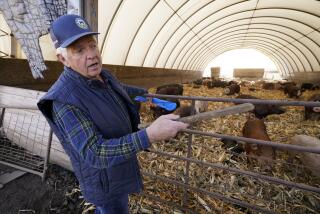Iowa Turns Pigs Into a Political Football
- Share via
DES MOINES — Iowa’s hog men are tense and fearful this icy winter, and the gloomiest among them are taking their complaints to a captive audience--the Republicans seeking support in the state’s Feb. 12 presidential caucuses.
Rooting for votes at the annual Pork Congress, a yearly celebration of rural technology that drew 6,400 pig farmers here this week, is a necessity in any Iowa caucus season. As this year’s candidates went about their ritual attempts to portray themselves as the farmer’s best friend, their audiences were buzzing about more than federal farm subsidies.
Business is booming in Iowa’s swine industry. But the state’s quarter-million farmers are torn over who should reap the profits. Iowa has been invaded by giant hog lots, massive porcine warehouses where thousands of pigs are born, fed and mated, then led to slaughter. The growth of these hog cities has roused some farmers to use the caucus campaign to demand that candidates explain how they would stop the spread of noxious swine fumes and wastes and contend with the feared economic displacement.
Every four years, states such as Iowa that play an early and significant role in the presidential campaign impose their own skewed sense of reality on American politics. Local issues can bubble up into prominence at any moment, stirred by intimate encounters between politicians and voters, by activists’ cries for attention and by the candidates’ hunger for a winning issue. There is no purer way for voters here to remind presidential aspirants that they too have a say in what is important.
“The caucuses are a perfect vehicle for the birth of an issue,” said Peverill Squire, a University of Iowa political scientist. “If you can find the right cause to rally people around, you have a ready-made, committed group of voters. Candidates pick up on that.”
During the 1980 and 1984 caucuses, vocal Iowa peace and nuclear-freeze activists forced Democratic contenders to take stands on these issues. The Rev. Jesse Jackson took up regional labor disputes to broaden his campaign appeal during his two tries for the presidency.
In 1988, the rising popularity of home schooling in Iowa helped buoy Christian broadcaster Pat Robertson’s surprising second-place finish in that year’s Republican caucus.
To GOP contenders trying to stay on message this year in a campaign wedded to national issues like the flat tax, the federal budget deficit, abortion and anti-Washington sentiment, hog lots can be a distracting local sideshow--or a pungent opportunity.
Conservative commentator Patrick J. Buchanan has made hog lots a key issue in his arsenal of populist causes. He rails against “the putrid odors” emanating from “factory farms” (making the issue reminiscent of the criticism directed at then-Arkansas Gov. Bill Clinton during his 1992 presidential bid over the environmental problems caused by his state’s poultry industry--another example of a local issue assuming magnified importance on the national stage).
Buchanan has depicted himself as the farmer’s only ally against the “cult of efficiency and giganticism” in the heartland. And the depth of rural anger against Iowa’s hog lots has impressed Buchanan to the point where he is considering a television ad blitz on the issue.
“Farmers talk about it everywhere I go,” Buchanan said after a Des Moines rally last week. “Whenever I bring it up, the audience explodes.”
Different Strategies
Sen. Richard G. Lugar of Indiana, a farm owner who wooed a handful of Pork Congress delegates in front of a banner urging them to “Put a Farmer in the White House,” also refers to hog lots in his speeches. But Lugar shies away from Buchanan’s populist tilt, saying the federal government should only get involved if they become “health or safety issues.”
The other leading candidates, Senate Majority Leader Bob Dole, Sen. Phil Gramm of Texas, publishing magnate Steve Forbes and former Tennessee Gov. Lamar Alexander, rarely mention the state’s sprawling concentrations of hogs on their own. They see no advantage in taking up the cause--its populist bitterness does not jibe with their conservative enthusiasm for big-business growth.
They also are aware that any high-profile stumble on local issues can lead to disaster. Democratic contender Michael S. Dukakis was hurt in 1988 when he suggested that distressed Iowa farmers might find a way out of their economic doldrums by growing an alternative crop like Belgian endive. The remark bombed in corn country. Dukakis ran third in that year’s caucus.
Even as most of this year’s GOP candidates steer clear of the hog lot issue, a few edgy encounters with angry farmers have forced them to become quick studies.
Dole was asked about it during his stop at the Pork Congress, where chattering feed salesmen in pig-head ties hawk their wares, farm boys crowd in awe around towering aluminum grain feeders and farmers’ wives applaud their favorite Pork Queen contestants.
Dole handled the question by insisting hog lots are a “state problem,” adding that the federal government need only intervene to prevent them winning unfair tax advantages or excessively polluting the environment.
Gramm got his own uncomfortable introduction to the issue last year while talking with voters in Ames. Kermit Miskell, a leader of the anti-hog-lot movement, rose to ask what Gramm would do about “these hog lots.” Gramm had to confess his ignorance.
These days, he has a pat answer. “Pigs are giant chemical factories,” he explains. “We need to tinker with the feed mix and the odor problem can be dealt with. The solution is in research.”
At their Pork Congress exhibit booths, farm salesmen echoed Gramm’s hopes for a “silver bullet” that might nullify the odor and environmental hazards of hog wastes. They bandied giant fans, perfume sprays and deodorant feed additives, Micro-Aid to “reduce ammonia and noxious gases” and MPC for “healthier hogs” and “happier neighbors.”
The consensus among pork industry leaders is that an effective, cheap environmental remedy is years away. But that did not deter chemical salesman Sherm Chandler from touting his company’s bottled odor elixir.
“This stuff is like Pac-Man,” said Chandler, an affable glad-hander in a pink pig tie. “It eats up everything, cuts down on your nitrogens, your methanes, keeps your hog stress down. . . . My clients love it.”
Angry Farmers
Veteran farmers like Miskell grit their teeth at such talk. And they are as suspicious of candidates as they are of fast-talking salesmen, yearning for someone with “clear answers” for their problems.
Some support Buchanan. Others say even his fiery broadsides against hog lots contain few details on how to contend with their complex economic and environmental woes.
“You’d think at least one of these guys would talk some sense,” muttered Miskell, 68, a glum-faced farmer from Story City who once raised several hundred head of hogs and now sells swine-birthing equipment to neighbors.
Hog lots are sprouting up all through the north-central region where he lives. In Wright County, where farms with 2,000 pigs were once considered big, a single lot known as the “mega-site” breeds 24,000 pigs.
Miskell worries about their economic impact on his two sons, who raise several dozen hogs as part of their grain-farming operations, and on his pig-breeding customers. Miskell also complains about the stifling odor that wafts up from the hog waste lagoons and blows his way on summer days.
Farmers who have worked with hogs all their lives say the smell is so pervasive that schoolchildren who live near the lots are taunted by playmates because their clothes reek. Retirees grow faint. Blaine Nickels, 67, a farmer and hog lot foe who lives 4 miles from the mega-site, says there are days when “I feel like packing up and moving out of farm country.”
“Take a whiff of that,” Nickels said as he drove past the mega-site on a frigid Saturday morning. The barracks-like hog pens and waste lagoons were heaped with a foot of snow; the acrid odor in the air was weak, but still detectable. “The lagoons are iced over now. Come spring, you wouldn’t want to get this close.”
Pork industry leaders acknowledge that hog lot odor can get excessively rank and that wastes sometimes seep from the giant lagoons, fouling underground aquifers and neighboring waterways. Several massive fish kills were reported in Iowa last year.
But they claim that the environmental arguments mask economic fear and jealousy. The most vocal opponents are older farmers nearing retirement who “don’t want to go into debt to buy new equipment and just don’t want to change their ways,” said Mike Blaser, general counsel for Iowa Select Farms, one of the state’s largest operators of giant hog lots and a partner in the Wright County mega-site.
Economic Pressures
Hog lots are the wave of the future, say proponents like Blaser, because of inexorable structural changes in the pork industry. Consumers want leaner pork, the “other white meat.” To provide it in bulk, breeders need to invest in new equipment and technology to mass-produce hogs with less fat. The lots first sprung up a decade ago in North Carolina, now Iowa’s main pork industry rival. Either Iowa changes with the times or its pork industry fades, Blaser said.
Inside one of Iowa Select’s sow farms, 3,800 grunting pregnant pigs lay practically immobilized in small individual pens, each fed and watered through tubes.
Hog wastes are used as fertilizer, but to keep costs down, Blaser said, their vast wastes have to be temporarily stored outside in the gaping lagoons that provoke neighbors into fits of fury.
“I’d like just one of these candidates to come up here and take a tour of these places,” Miskell said as he drove past the iced-over lagoons of a Story County hog lot. “If they smelled what we smell every day, maybe we could get some action.”
A Dole supporter when the Kansas senator won the Iowa caucuses in 1988, Miskell is leaning toward Buchanan. He talks about collaring the candidate when he passes through on his next campaign swing. There are other farmers Miskell wants Buchanan to meet, hog men and grain men who have their own tales of odoriferous woe.
“All these fellows should be talking about the issue,” Miskell said. “There’s enough farmers in this state that if just one candidate talked real sense, they could do themselves some good. Us too.”
More to Read
Get the L.A. Times Politics newsletter
Deeply reported insights into legislation, politics and policy from Sacramento, Washington and beyond. In your inbox twice per week.
You may occasionally receive promotional content from the Los Angeles Times.








